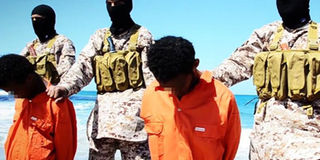US struggles to stop IS onslaught

An image grab taken on April 19, 2015 from a video reportedly released by the Islamic State (IS) group through Al-Furqan Media men described as Ethiopian Christians captured in Libya kneeling on the ground in front of masked militants before their beheading on a beach at an undisclosed location in Libya. PHOTO | FILE |
What you need to know:
- Critics of air-power strategy say 75pc of warplanes return without dropping bombs
- Air power advocates have blasted the current operation as overly cautious, citing a statistic that roughly 75 per cent of all warplanes return from strike missions without dropping a bomb.
WASHINGTON, Saturday
A year after Islamic State jihadists overran much of Iraq, the United States and its allies are struggling to turn the tide against the extremists and their self-declared “caliphate.”
As it tries to lead an unwieldy international coalition, Washington has pleaded for patience but has yet to arrive at a successful formula that can cripple the well-funded, opportunistic jihadists in Iraq and Syria.
President Barack Obama’s strategy — a combination of US-led air power with advice and weapons for local forces — was supposed to stop the onslaught and buy time for an eventual push to roll back the jihadists.
There have been some modest victories, including in the defence of the besieged northern Syrian town of Kobane and most recently in Tikrit, north of Baghdad.
But the IS group shows no sign of weakening and has seized yet more territory in recent weeks.
“Realistically our strategy is to contain ISIL (IS) right now,” said David Barno, a retired general who once led the US war effort in Afghanistan. “And I don’t think we’re succeeding at that.” The jihadists have no shortage of money, weapons or recruits and they have proved brutally savvy about exploiting the Sunni-Shiite sectarian divide plaguing Iraq and the region. “This is an organisation that’s on the move.
It’s got momentum. It’s building,” said Barno, now based at American University. “All the conditions for it to expand are present.”
The IS group’s capture of Ramadi in Iraq’s Anbar Province last month — against a larger foe backed by the world’s most powerful air force — represented a stunning defeat for the Iraqi army and the US-led coalition’s campaign.
But despite the rout, Obama has made clear he is sticking with his strategy — one that rules out any ground combat for American soldiers.
To help the Iraqis retake Ramadi, the US president this week approved the deployment of dozens of military advisers to Anbar. Critics and political opponents dismissed the move as a half-measure doomed to fail.
The administration’s approach amounts to “creeping incrementalism,” said Anthony Cordesman of the Centre for Strategic and International Studies, an outspoken sceptic of Obama’s war plan.
Air power advocates have blasted the current operation as overly cautious, citing a statistic that roughly 75 per cent of all warplanes return from strike missions without dropping a bomb.





